Price rises and carbon tax are making it expensive to run oil and gas boilers in Ireland. That’s why people are switching to efficient alternatives like ground source heat pumps. But what are the pros and cons of a ground source heat pump? Is it the right option for you? Read on for all you need to know before you invest in a ground source heat pump in Ireland.
What is a ground source heat pump?
A ground source heat pump is a machine that can heat a house or other building. As the name implies, it sources this heat from the ground. And it pumps the heat into your house using electricity. Many models also provide hot water for showers and taps. Ground source heat pumps also go by the names of geothermal heat pumps and ground to water heat pumps.
How does a ground source heat pump work?
A ground source heat pump works in three steps, and has one part for each step:
1) The ground loop: This is a series of pipes embedded in the ground outside a building. Cold water flows through these pipes and gets warmed up to earth temperature.
2) The pump: Water from the ground loop flows to the pump. This is a device, smaller than a fridge that usually goes inside a utility room in your house. Using electricity and a “refrigerant” gas, the heat pump pushes heat from the ground loop into your central heating.
3) Central heating: Warm water from the heat pump flows through radiators or underfloor heating to heat your home. There can also be an outlet for hot water to showers and taps. This part is just like any other central heating system.
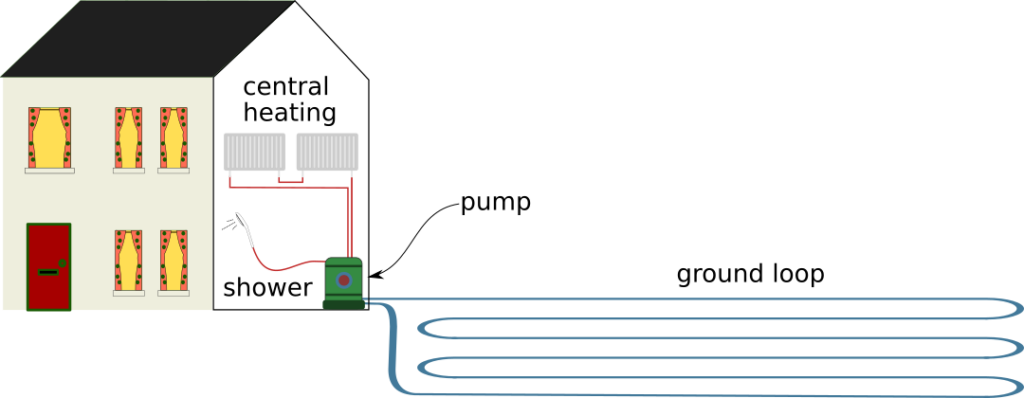
The two types of heat pump ground loop
There are two main kinds of ground loop for ground source heat pumps. The two types are equally effective. However, they have different requirements for installation.
The first kind of ground loop is the “horizontal loop”. In a horizontal loop, pipes are laid out across a wide area, about a metre underground. This is typically the preferred option due to its lower cost. However, a horizontal loop requires a subsoil depth of at least 1 metre, so it’s not a viable option in all areas. The space requirement can also be an issue: You’ll generally need a garden at least 2.5 times the size of your house to accommodate a horizontal ground loop. This brings us to the second option – vertical ground loops:
The alternative to a horizontal ground loop is a vertical ground loop. Vertical ground loops are also known as boreholes, because they involve drilling deep into the earth. These boreholes are only a few inches wide, but can be anywhere from about 60 metres to several hundred metres deep. As mentioned, vertical loops are generally more expensive than a horizontal loops, but they work in many areas where horizontal loops do not. You can check the suitability of your area for a vertical ground loop using a tool on Geological Survey of Ireland’s website. Or check the map below for an approximate idea:
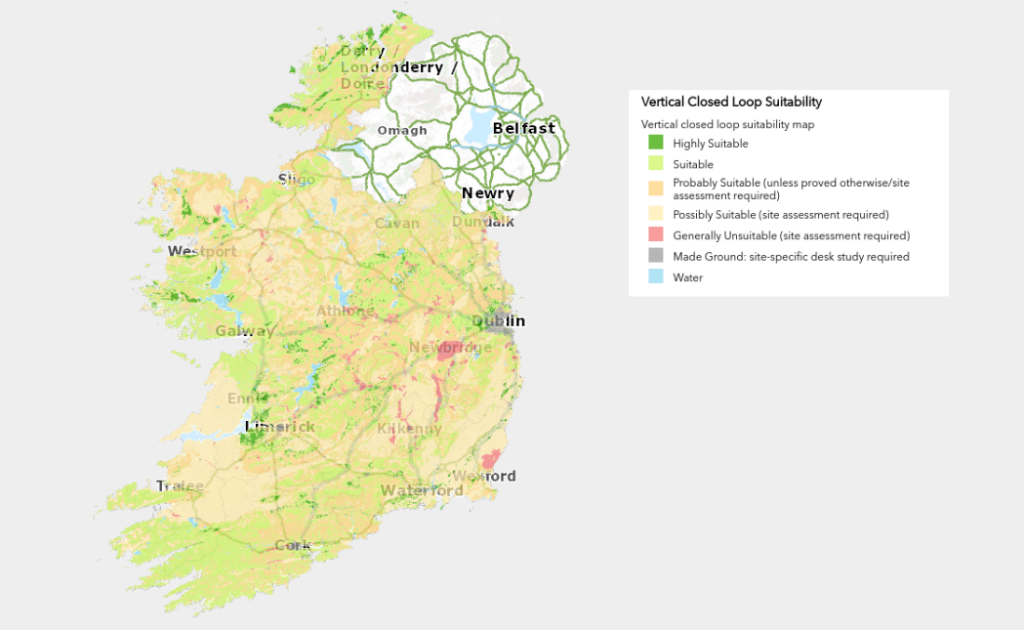
Do ground source heat pumps work in the Irish climate (including winter)?
Absolutely! The temperature of the earth underneath Ireland is fairly constant at around 11 degrees Celsius. That’s more than warm enough for a ground source heat pump to work efficiently. And there’s little difference between summer and winter. Indeed, ground-source heat pumps in the Norway, Sweden and Finland work right through the Scandinavian winter. Irish winters are mild by comparison and pose no problem for the right ground source heat pump.

What does a ground-source heat pump cost to run?
Properly installed ground source heat pumps are very cheap to run. This is because they extract free heat from the ground, rather than burning expensive oil or gas.
A heat pump still needs some electricity to run. However, a good ground source heat pump can provide 5 units of heat for every 1 unit of electricity used. Or stated differently, a ground source heat pump is around 500% efficient. The exact number depends on the brand, the climate, and your central heating system.
For a ground-source heat pump to work well, it’s also essential that your home is well-insulated. If your home is poorly-insulated, you must get an insulation upgrade before installing a ground-source heat pump. Otherwise, your potential savings go out the window (and roof, and floors, and walls).
So, assuming decent insulation, the table below shows how energy usage translates into annual energy costs. I’ve included rival energy sources for comparison:
| Price per kWh input | Efficiency | Price per kWh output | Annual Heating Energy Cost | |
| Electric Radiators | €0.35 | 100% | €0.35 | €3,500 |
| Oil Boiler | €0.123 | 90% | €0.137 | €1,370 |
| Gas Boiler | €0.15 | 90% | €0.167 | €1,670 (+ €200 standing charge) |
| Air Source Heat Pump | €0.35 | 400% | €0.0875 | €875 |
| Ground Source Heat Pump | €0.35 | 500% | €0.07 | €700 |
€700 is pretty good to heat a house for a year these days. But there is a catch – the up-front cost to install a ground source heat pump:
Why are ground-source heat pumps so expensive to install?
There are two main reasons for the high upfront cost of ground source heat pumps.
First, ground source heat pump hardware itself is relatively expensive. A heat pump contains a powerful motor and compressor. And ground-source heat pumps need a network of pipes to capture heat from the earth outside. These factors contribute to an inherently high manufacturing cost.
Second, installing the ground loops requires specialised machinery. For horizontal loop systems, this usually means hiring an excavator for a couple of days to dig trenches for the pipes. For vertical loop systems, the cost is even higher, as a special rig is needed to drill boreholes deep into the earth.
The result is that ground source heat pumps typically cost €15,000 – €28,000 in Ireland. This is more than any other popular heating system, making cost the main disadvantage of ground source heat pumps. Thankfully though, you can get a grant to help with the cost of a ground-source heat pump:
The €6,500 SEAI grant for ground source heat pumps in Ireland
As of 2022, the Sustainable Energy Authority of Ireland offer grants for ground source heat pumps in Ireland. Specifically, you can get €4,500 towards the cost of installing a ground source heat pump for an apartment. And you can get €6,500 to install a ground source heat pump for a house. So the SEAI grant brings the fully-installed cost of a ground source heat pump down to €8,500 – €21,500.
Another way to save on a ground-source heat pumps is to get one installed as part of a “deep retrofit”. This refers to a package of energy upgrades carried out on your home in one go. You can get a grant of 50% for deep retrofits in Ireland. A deep retrofit grant brings the installed cost of a ground-source heat pump down to €7,500 – €14,000.
Will a ground-source heat pump save you money overall?
Taking both upfront costs and running costs into consideration, we can compare the overall cost of various heating systems, over 25 years. For simplicity, let’s assume that energy price stay constant (based on Irish January 2023 energy costs). In reality, the numbers for gas and especially oil will likely get worse with increasing carbon taxes.
| Installation Cost (after grants) | Annual Energy Cost | Energy Cost Over 25 years | Annual Servicing Cost | Servicing Cost over 25 Years | Total Cost Over 25 Years | |
| Electric Radiators | €1000 | €3,500 | €87,500 | €0 | €0 | €88,500 |
| Oil Boiler | €3000 | €1,370 | €34,250 | €80 | €2,000 | €39,250 |
| Gas Boiler | €3,000 | €1,870* | €46,750 | €90 | €2,250 | €52,000 |
| Air Source Heat Pump** | €10,500 | €875 | €21,875 | €70 | €1,750 | €34,125 |
| Ground Source Heat Pump | €12,500 | €700 | €17,500 | €0 | €0 | €30,000 |
*includes €200 standing charge
**allows for 1.5 air source heat pump lifetimes used (16.7 years each)
As you can see from the table, a ground-source heat pump is the cheapest heating option over 25 years.
So a ground source heat pump will save you lots of money compared to burning oil, gas, or electricity for heat. And over the long term, it can even beat an air-source heat pump in overall cost of heating.
Are ground source heat pumps better than air source heat pumps?
As we’ve seen, ground source heat pumps are a slightly more efficient than air source heat pumps, and have a higher installation cost. So they are the long-term financial winners. But ground source heat pumps have some other advantages to consider.
First up is quietness. Air source heat pumps create fan noise – about 45-60 decibels at a distance of 1 metre from the fan. You can generally manage fan noise by locating the air source heat pump away from people or choosing a quiet model. Still, ground source heat pumps easily win the quietness contest. The use of a ground loop totally eliminates the need for a fan – the nosiest component of most heat pump systems.
Another advantage of ground source heat pumps over air source heat pumps is aesthetics. With the pump itself situated indoors, and the heat source underground, a ground source heat pump leaves no trace outside the property. So it’s well worth considering a ground source heat pump if appearance or saving outdoor space is a priority for you.
Finally, ground-source heat pumps have lighter maintenance requirements. Unlike air source heat pumps, ground source heat pumps generally don’t require annual servicing. Moreover, ground-source heat pumps are the better option for seaside locations where salt mist can quickly corrode above-ground air source heat pumps parts. And they may have longer lifespans, even when used far inland sea, due to the absence of a fan and associated motor.
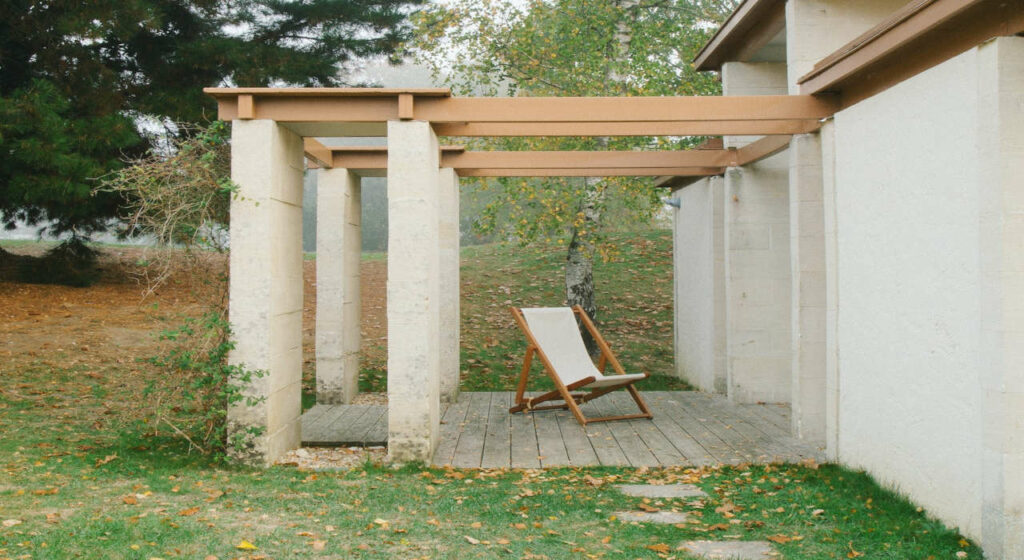
Ground source heat pumps and underfloor heating
Ground source heat pumps work great with underfloor heating. Here’s why:
First, the two technologies have matching heating schedules. Specifically, both ground source heat pumps and underfloor heating work best when the heating is run constantly at a low level.
Second, underfloor heating can warm a house even using lukewarm water. This helps to maximise the efficiency of the heat pump.
Can ground source heat pumps work with radiators?
You can also use a ground source heat pump with radiators. Indeed, this is a popular option where a ground source heat pump is replacing an old oil or gas boiler. But making a ground source heat pump work well with radiators takes planning. This is because radiators traditionally operate using hot water, while heat pumps are most efficient at warm temperatures.
Specifically, to use a ground source heat pump with radiators, you’ll probably have to take at least one of these steps:
- Insulate your house really well
- Upgrade to more powerful radiators
- Add some extra radiators
- Use a special high temperature ground source heat pump (less efficient)
Cooling (air conditioning) with a ground source heat pump
Air conditioning isn’t usually something that Irish households need to consider, but there are some cases where cooling can come in handy. Specifically, houses with thick insulation can sometimes overheat in summer – even in Ireland.
Many ground source heat pumps can be run in reverse to provide cooling in these situations. Such heat pumps have a reversible valve, and sensors to measure humidity inside the building. This is to prevent condensation from forming on floors and radiators.
The need to prevent condensation limits the amount of cooling that ground source (ground to water) heat pumps can deliver. But they’re well able to handle the modest cooling needs of well-insulated Irish houses.
“Passive” cooling ground source heat pumps
Passive cooling is a special technique for cooling using a ground source heat pump. With this method, cool water is simply circulated from the earth to your central heating system. This contrasts with “active” cooling because there’s no pumping of heat.
Passive cooling is super energy-efficient. But seeing as cooling is so rarely required in Ireland, the overall difference in energy consumption between active and passive cooling with a ground source heat pump will be small. So it’s a nice-to-have feature, but not dramatically better than active cooling (which is still already very efficient using ground source heat pump).
Do ground source heat pumps work in old houses?
Ground source heat pumps work best in well-insulated houses. That doesn’t mean that you can’t have a ground source heat pump in an old house. It just means you’ll probably need to insulate the house, first.
A Technical Advisor can determine if your house has the required level of insulation to install a ground source heat pump. If not, the Technical Advisor will outline how to upgrade the insulation to heat pump standard.
To get an old house ready for a ground source heat pump, you’ll typically need:
- Good air-tightness (no draughts)
- Thick insulation in the attic/rafters
- Insulated walls
- Double, or preferably triple, glazing
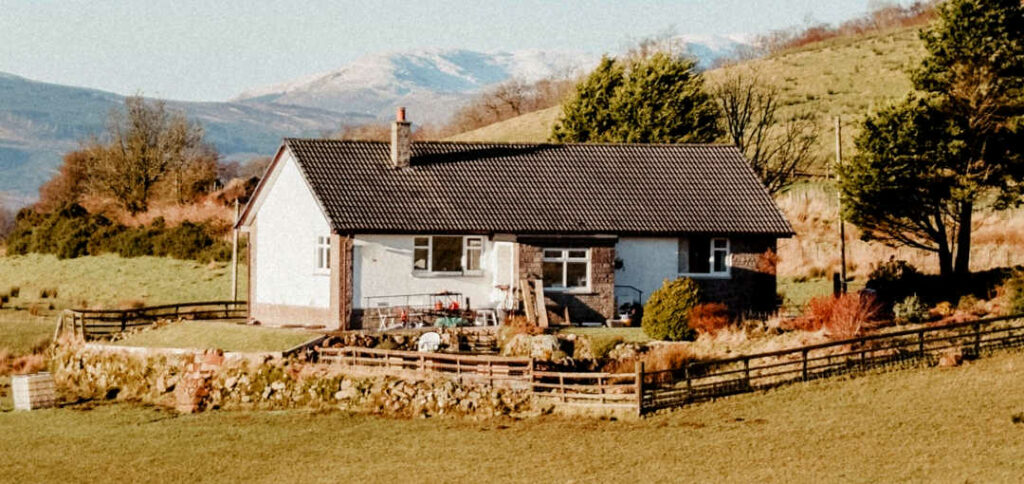
Are ground source heat pumps noisy?
A ground source heat pump produces around the same amount of noise as a fridge. However, this varies depending on the brand of heat pump. Your central heating system may also include a pump to circulate water from the heat pump, which can cause additional noise/vibrations. But noise won’t be a problem as long as the pump is installed in a suitable location (not on a thin piece of wood beside a bedroom).
The ideal setup is to locate the ground source heat pump unit in a utility room, so the small amount of noise will cause no trouble at all.
Do ground source heat pumps need planning permission?
Since 2007, ground source heat pumps generally do not require planning permission in Ireland. This is because of legislation that was introduced at the time to encourage various types of renewable energy.
Advances in ground-source heat pump systems: Efficiency, refrigerants, inverters
Ground source heat pumps have been around for decades, but the technology continues to advance. Some of the recent advances have been in efficiency, environmentally-friendly refrigerants, and inverter technology.
Efficiency refers to the amount of heat you get from a ground source heat pump for every unit of electricity you put in. In recent years, ground source heat pump manufacturers have advanced efficiency beyond 500%. And one manufacturer, Thermia, even managed to exceed 600% efficiency with their 18 kW Atlas heat pump. When buying a ground source heat pump, go for the highest efficiency you can, as this will give you the biggest savings on your energy bills.
There’s also an advance towards eco-friendly refrigerants inside ground source heat pumps. Older refrigerants which damage the atmosphere are being replaced with more eco-friendly ones. First, R-410a replaced R-22. Now, R-32 is replacing R-410a. And eventually, R-290 will replace R-32. My advice is to stay ahead of the advances in ground source heat pump refrigerants. Where possible, choose R-290 and avoid R-410a. This will make it easier to service your heat pump decades from now, when environmental restrictions on refrigerants are much tighter.
But perhaps the biggest advance in ground source heat pump technology is the use of inverters. Inverters let the heat pump compressor throttle its power to match the heating demand at any moment. This reduces the need for the pump to cycle on and off, which has several benefits:
- Prolongs the lifespan of moving parts
- Increases efficiency
- Reduces or eliminates the need for a buffer tank to save space
Do ground source heat pumps work with solar panels?
There are two types of solar panels: Photovoltaic/PV (for electricity) and thermal (for hot water). Let’s consider them each in turn.
Ground source heat pumps and PV solar panels are a great match. This is because PV solar panels supply electricity, which your ground source heat pump can use. In fact, a house with a ground source heat pump and plenty of solar panels can have minimal energy bills. Think about it – no oil bill, no gas bill, and only low electricity bills thanks to the solar panels.
You can also have a ground source heat pump and thermal solar panels. However, this combination doesn’t make financial sense. This is because most ground source heat pumps already provide low cost hot water for taps and showers. So the thermal solar panels become somewhat redundant. But if you still want to have both technologies, you absolutely can. Just understand that the financial return of the thermal solar panels will be low in this case.
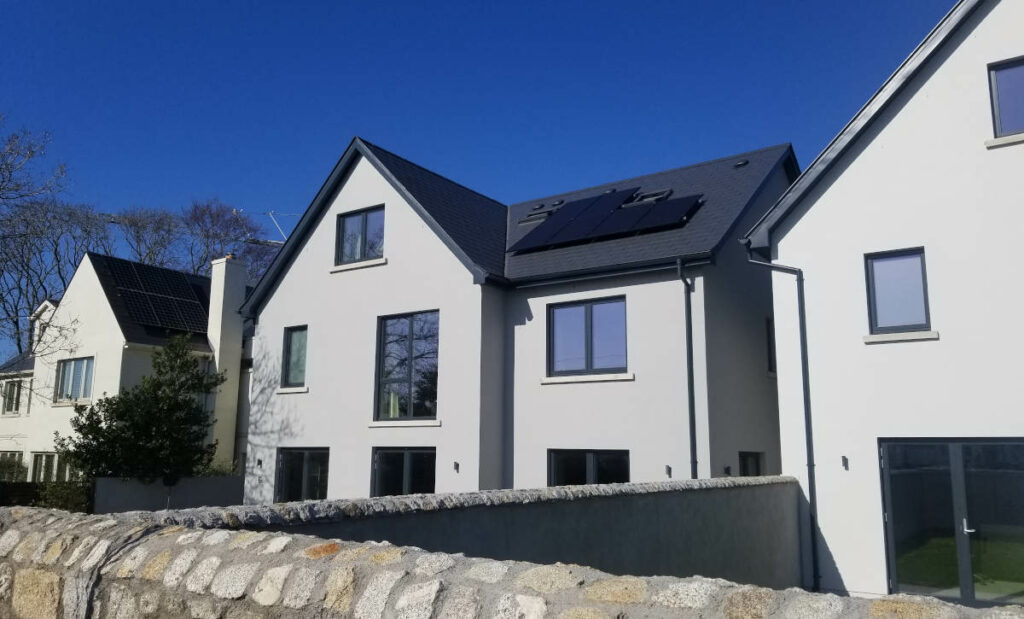
Are ground source heat pumps reliable?
Like any product, the reliability of a ground source heat pump depends on the specific brand and manufacturer. So it’s important to choose a ground source heat pump brand with a strong warranty and a reputation for reliability. Top manufacturers currently offer warranty periods of around 7 years for their ground source heat pumps.
Correct installation is essential for a ground source heat pump to work well. So get your ground source heat pump fitted by qualified tradespeople with a good reputation.
In general though, ground source heat pumps have a good reputation for reliability. Indeed, plenty of decades-old ground-source heat pumps are still working great today.
Are ground source heat pumps good for the environment?
Ground source heat pumps require only a small amount of energy to heat a house. This energy saving results in lower CO2 emissions, which is great for the environment. Moreover, Ireland’s electricity supply is shifting towards renewables (about 40% of our electricity comes from wind as of 2022). So the environmental advantage of ground source heat pumps gets even bigger over time. And you can always install your own solar panels to power your ground source heat pump directly using renewable energy.

Refrigerant gases are the only black mark on the environmental credentials of ground source heat pumps. Specifically, many ground source heat pumps contain HFC refrigerants. These are powerful greenhouse gases that contribute to global warming. On the other hand, the damage done by HFCs in heat pumps is far less than the damage done by burning oil or gas in a boiler. But to be on the safe side, you can choose a ground source heat pump that uses an atmosphere-friendly refrigerant like R-290.
Is a ground source heat pump worth it overall?
A ground source heat pump is definitely worth it compared to an oil or gas boiler. This is because a ground source heat pump will save you thousands or tens of thousands of euro over its lifetime compared to oil or gas. Plus, you’ll be helping the environment and increasing your property value.
But the more difficult question is – is a ground source heat pump worth it compared to an air source heat pump? Unfortunately, the higher entry price for ground source heat pump simply counts them out as an option for many people. But if you can stomach the upfront cost of a ground-source heat pump, there’s a lot to love…
First is quietness. The absence of a fan unit means ground source heat pumps can be whisper-quiet. Next is the location of components. With a ground source heat pump, all the outdoor components can be hidden underground. This is great for appearance, space-saving, and protection from accidental damage or vandalism. Another plus is that ground-source heat pumps generally don’t require an annual service. Finally, higher efficiency makes ground-source heat pumps the optimal option for the environment.
Some people also just like the appeal of ground source heat pump technology. If you simply want the best technology regardless of price, then a ground source heat pump is probably for you, too.
Overall, the ground source vs air source heat pump decision comes down to personal preference and budget. Here’s my closing advice: If upfront cost is the key factor, then go for an air source heat pump. But if budget allows, and you want the very best heating system for your home, then go for a ground-source heat pump.